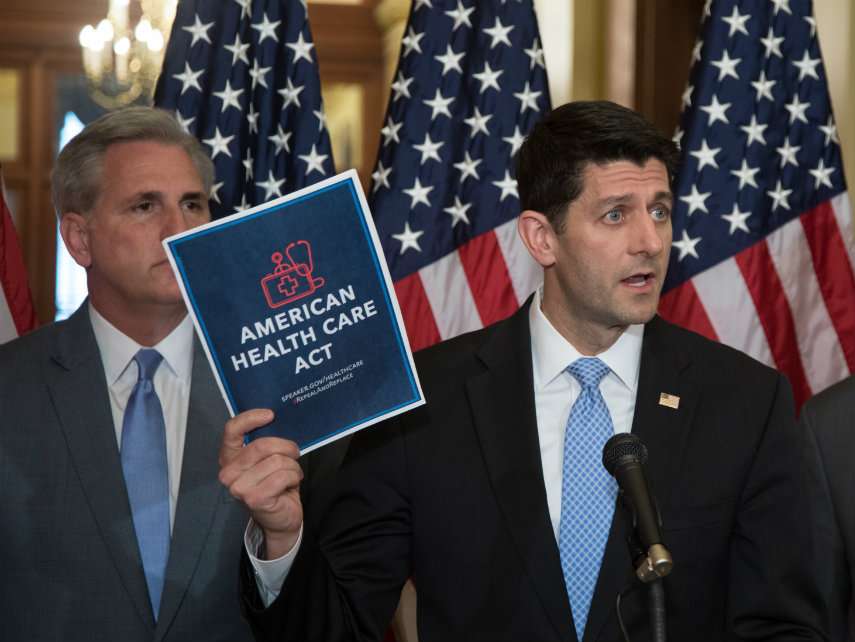Obamacare Remains Unstable, Even as Insurers Fill Bare Counties
Premiums are on the rise and competition remains weak in much of the country.

At the beginning of the summer, as congressional Republicans were pushing to pass health care legislation, it looked as if, in some places, a major component of Obamacare might simply cease to exist, all on its own.
More than 40 counties across the country appeared likely to have no insurer available in the health law's exchanges. Major news organizations published reports warning that, after insurers made their final decisions, hundreds of counties could ultimately be left bare under the law.
Instead, the opposite has happened.
All of the counties that were expected to be bare now have at least one participating insurer. The Republican effort to rewrite the health care law has stalled indefinitely, and may never be revived. A new government report published today finds that health insurance coverage has increased nationally this year by about 500,000 people. Obamacare, which languished in the polls throughout President Obama's time in office, is now more popular than ever.
Yet all is not entirely well with the law. Although there are no bare counties, major health insurance companies like Aetna and UnitedHealth have pulled out of the program, and 47 percent of counties, covering about 23 percent of health law enrollees, will have just one option in the exchange.
This is hardly the boon for consumer choice that President Obama promised back in 2009, when he declared, in a speech making the case for health care reform, "My guiding principle is, and always has been, that consumers do better when there is choice and competition. That's how the market works. Unfortunately, in 34 states, 75 percent of the insurance market is controlled by five or fewer companies. In Alabama, almost 90 percent is controlled by just one company. And without competition, the price of insurance goes up and quality goes down."
Under Obamacare, dramatic price increases are exactly what's happening. In Maryland, for example, a state that has generally favored the law, exchange premiums will jump an average of 33 percent. And that hike is lower than what insurers requested: State insurance regulators negotiated carriers down from initial requests for rate increases averaging 43 percent.
Although the majority of the people covered under Obamacare will be relatively insulated from those hikes thanks to the law's insurance subsidies, that just means that taxpayers will shoulder the additional cost. And those who earn too much income to qualify for subsidies will be stuck with substantially higher bills, yet again. So it's no surprise that they are fleeing: The market for unsubsidized coverage shrank 29 percent in the last year, according to insurance industry consultant Bob Laszewski.
Among the insurers that has stepped in to fill many of the counties that were expected to be bare is Centene, which built its business on Medicaid managed care, in which insurers take over caseloads from states. Centene has been more successful than other companies in Obamacare's exchanges, in part by relying on narrow provider networks. Under these sorts of plans, coverage through Obamacare looks more like coverage through Medicaid than what most people expect from private insurance.
Even the bare county problem, meanwhile, may be merely delayed rather than solved. In Ohio, which earlier this year expected to have 20 counties with no insurer, the state's Department of Insurance Director, Jillian Froment said, "This is a temporary solution and one that only applies to 2018. Beyond that, insurers are still looking for predictability in the health insurance market."
Predictability, in this case, may turn out to mean "stabilization funds"—or, less generously, publicly funded bailouts. The future of the health care law looks less like total collapse and more like consistent unsteadiness and worries about decline, while lawmakers attempt to prop it up on a nominally temporary basis.
The health care law may have avoided repeal, or any of the not-quite-repeal options that congressional Republicans considered. And it may have plugged the holes in the insurance market, at least for now. But it has hardly settled into a stable equilibrium, and the ways in which it is unstable and inadequate are unlikely to improve rapidly on their own. Obamacare may not be failing. But in many ways, it is flailing.


Show Comments (27)